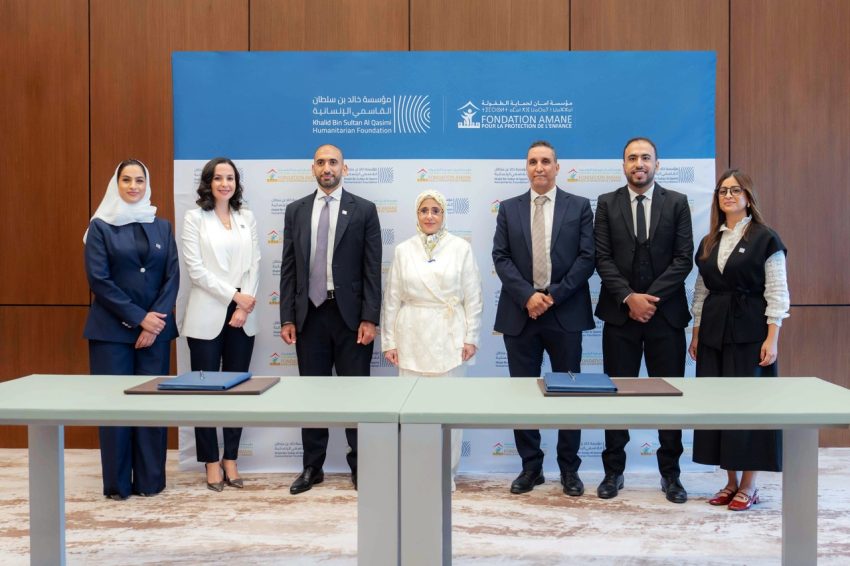SHARJAH – Her Highness Sheikha Jawaher bint Mohammed Al Qasimi, Wife of the Ruler of Sharjah and Chairperson of the Khalid bin Sultan Al Qasimi Humanitarian Foundation (KSQF), has launched two major humanitarian initiatives in the Kingdom of Morocco to strengthen child protection systems, expand rehabilitation pathways, and improve community resilience for vulnerable children — including migrant and refugee children from more than 60 countries currently hosted in Morocco.
The new programmes, implemented through partnerships with leading national child protection organisations, are expected to collectively reach more than 5,000 beneficiaries, including children, families and community members, in addition to strengthening institutions and frontline social care structures.
KSQF, established in 2024, focuses on protecting and empowering children affected by conflict, poverty and natural disasters worldwide. Its work targets reducing exposure to exploitation, child labour, violence and trafficking through community awareness, improved systems, protective services and international partnerships.
Under the new effort in Morocco, the first programme — executed with Fondation Amane pour la Protection de l’Enfance (FAPE) — aims to strengthen local protection structures in the Sous-Massa region by mobilising communities, government bodies and frontline social workers. The 17-month project will directly reach 740 children and families, while indirectly supporting more than 5,000 people. It also links and coordinates with 180 public, community and institutional actors to improve identification, response and long-term care systems.
The second initiative, jointly funded with The Big Heart Foundation (TBHF) and implemented by Bayti Association, will focus on prevention, rehabilitation and reintegration of children in street situations, helping them regain safety, confidence and educational continuity. The project will support 100 children and 140 family members through access to shelter, psychosocial support, health care, education and vocational training. Bayti’s Farm School programme will be used as a unique rehabilitation model, using organic agriculture training to rebuild trust, routine and personal development.
Her Highness said the initiatives reflect the late Sheikh Khalid bin Sultan Al Qasimi’s belief that protecting childhood is the foundation for building strong, cohesive and peaceful societies. She emphasised that creating safe environments for children requires collective responsibility between governments, humanitarian organisations, and wider communities. “We cannot find peace knowing there is a child deprived of care, education or healthcare. The future depends on a generation raised with awareness of rights, dignity and opportunity,” Sheikha Jawaher said.
She added that the UAE and Morocco share historic humanitarian values and a shared Arab responsibility to empower future generations to lead regional progress.
Officials noted that the initiatives align with Morocco’s national Integrated Public Policy for the Protection of Children, while also advancing UAE’s international efforts to promote rights-based childhood development and long-term social stability.
The humanitarian mission also included meetings with Bayti Association leadership, Moroccan government officials, and international agency representatives reviewing joint workstreams. KSQF representatives said the partnerships in Morocco are designed to become models that can be scaled in other regions facing similar child protection vulnerabilities.














